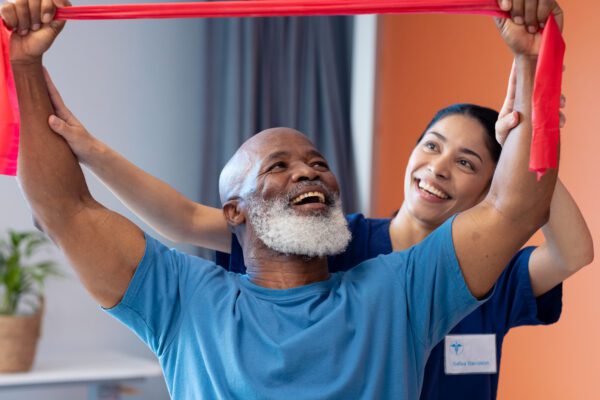Importance of Recovery Coaching
Recovery coaching is a critical component in the journey of overcoming addiction. It provides individuals with the necessary support to navigate their path towards sobriety successfully.
Benefits of Recovery Coaching
Recovery coaching offers numerous advantages for individuals seeking to overcome substance use disorders. As a motivational presence, recovery coaches play a distinct role in providing tailored support and guidance. Here are some key benefits:
| Benefit | Description |
|---|---|
| Personalized Support | Coaches work closely with individuals to address specific needs and challenges in their recovery journey. |
| Motivation and Encouragement | They provide essential motivation, helping individuals cope with emotional struggles and stay focused on their goals. |
| Goal Setting | Recovery coaches assist in setting realistic and achievable goals, fostering a sense of accomplishment as individuals progress. |
| Development of Life Skills | Coaches help individuals build essential skills for daily living, allowing for better coping mechanisms and healthier choices. |
| Stronger Social Networks | By fostering connections and support systems, recovery coaching enhances the individual’s network of supportive relationships. |
Recovery coaching aligns well with various therapeutic modalities, such as cognitive behavioral therapy, dialectical behavior therapy, and mindfulness-based therapy, enhancing comprehensive treatment programs.
Peer vs. Professional Coaches
In the realm of recovery coaching, it is essential to understand the differences between peer recovery coaches and professional recovery coaches.
| Type | Description |
|---|---|
| Peer Recovery Coaches | These individuals often share similar experiences with addiction and recovery. They can provide unique insight, empathy, and encouragement rooted in personal understanding. They often establish rapport easily but may not have professional training. |
| Professional Recovery Coaches | These coaches usually have formal training and may possess additional certifications. They focus on structured support, providing guidance rooted in proven recovery methodologies. They also tend to collaborate more closely with clinical professionals. |
Both peer and professional coaches offer valuable support, and choosing the right type depends on individual preferences and needs. At Totality Treatment, our approach incorporates elements of both types of coaching for a more holistic recovery experience, ensuring that we tailor our services to meet the unique challenges faced by each person.
For more information on how recovery coaching outpatient can complement your treatment journey, please explore our range of resources and programs available at Totality Treatment.
Finding the Right Recovery Coach
Selecting the appropriate recovery coach can significantly impact the effectiveness of our journey towards sobriety. Here, we will discuss recommendations from local groups and the importance of certification and experience.
Recommendations from Local Groups
When looking for a recovery coach, we can start by reaching out to local recovery groups. These organizations often have valuable insights and can provide recommendations for peer coaches. Peer coaches offer general support drawn from their own recovery experiences, and their relatability can foster a strong bond with those they assist. They understand firsthand the challenges faced during recovery and can provide empathetic support.
If we prefer a professional recovery coach, it’s essential to seek individuals certified through accredited organizations. This verification ensures that the coach possesses the necessary skills and knowledge to effectively support those struggling with addiction. We can inquire with local treatment facilities or addiction support groups for referrals.
| Local Resources | Benefits |
|---|---|
| Peer support groups | Shares personal recovery experiences, relatable support |
| Professional organizations | Validates the coach’s training and capabilities |
| Treatment centers | Provides reputable recommendations |
Certification and Experience
The credentials of a recovery coach are crucial in determining their capability to assist effectively. A certified recovery coach has undergone specialized training to develop their knowledge and skills in addiction recovery. Organizations like the International Association of Peer Supporters (IAOTS) have standards for certification, which requires a detailed application process. This includes submitting educational background information, work experience, and personal narratives explaining why they wish to become certified.
Moreover, aspiring recovery coaches can benefit significantly from volunteer work. This hands-on experience not only builds professional networks but also shows commitment to the recovery coaching field. Engaging in volunteer activities can enhance their skills and increase their ability to serve our community effectively.
Continuing education is essential for maintaining certification. It ensures that recovery coaches stay updated with best practices and advancements in addiction recovery. Workshops, conferences, and online courses provide avenues for coaches to further their education and improve their skills.
Selecting a well-qualified recovery coach enhances our support network. By considering local recommendations and verifying certifications, we create a solid foundation for successful recovery. For more guidance on therapy options, visit our pages on cognitive behavioral therapy and mindfulness-based therapy.
Role of Recovery Coaches
Recovery coaches serve a vital function in the journey of individuals dealing with substance use disorders. They provide a range of supports both before and after treatment, contributing to a solid foundation for lasting sobriety.
Before and After Treatment Support
Recovery coaching can be beneficial both before and after treatment. Coaches complement professional addiction recovery programs by providing additional support, which enhances the chances of achieving successful outcomes. Research indicates that individuals who engage with a recovery coach in the early stages of sobriety experience increased average abstinence rates by up to 82%.
Before treatment, recovery coaches assist individuals in identifying personal triggers, setting goals, and preparing for the challenges that lie ahead. They help clients navigate the uncertainties of starting their recovery journey and manage expectations effectively.
Once treatment is completed, recovery coaches play an essential role in facilitating a smoother transition back to daily life. They provide ongoing support in navigating obstacles, whether it’s dealing with challenging family dynamics or managing environmental triggers that may prompt relapse (Clearview Treatment Programs). This continuous support can make a significant difference in maintaining long-term sobriety.
Building Foundation for Sobriety
Recovery coaches also focus on building a strong foundation for sobriety. They work closely with clients to develop actionable plans, set achievable objectives, and foster personal wellness. This could involve creating a structured daily routine or identifying healthy coping mechanisms that align with one’s lifestyle.
By collaborating with recovery coaches, individuals can better manage daily challenges and reinforce their commitment to recovery. Coaches also provide resources, advice, and a supportive presence, which are crucial during the early weeks and months of sobriety when individuals may struggle the most (Abhaya Wellness). This consistent engagement allows individuals to proactively address potential setbacks while cultivating resilience against relapse.
Our approach at Totality Treatment focuses on these aspects of recovery coaching, ensuring that clients have the tools and support they need to thrive during their recovery journeys. For those seeking to enhance their recovery experience, our programs incorporate key elements of recovery coaching, empowering individuals to realize their fullest potential.
Skills and Responsibilities
Recovery coaches play a vital role in supporting individuals on their journey to sobriety. Among their many functions, customized recovery plans and effective communication are two critical skills that facilitate successful outcomes.
Customized Recovery Plans
We understand that each person’s recovery journey is unique. Recovery coaches are trained to develop tailored recovery plans that align with the specific needs of their clients. These plans address various life areas affected by substance use, such as employment, housing, and relationships. By focusing on these key aspects, recovery coaches help individuals navigate lifestyle adjustments that support sustained abstinence from substance misuse (Become a Recovery Coach).
In creating a customized recovery plan, we include personalized goals, action steps, and timelines, allowing clients to track their progress and make necessary adjustments. This structure not only provides accountability but also empowers clients to take an active role in their recovery. The table below illustrates common components of a customized recovery plan:
| Component | Description |
|---|---|
| Personal Goals | Specific objectives set by the client for their recovery journey |
| Action Steps | Detailed steps to achieve each goal |
| Support Systems | Identifying supportive individuals and resources |
| Progress Monitoring | Regular review checkpoints to track advancements |
Effective Communication
Effective communication is essential for recovery coaches as it fosters trust and encourages openness in the coaching relationship. Recovery coaches utilize various communication techniques, including active listening and motivational interviewing, to engage clients meaningfully. By developing strong rapport, recovery coaches can better understand their clients’ experiences, fears, and aspirations (Become a Recovery Coach).
Furthermore, recovery coaches are equipped to address challenges that may arise during the recovery process. They assist clients in recognizing obstacles and provide guidance on overcoming them. The commitment to maintaining clear and open lines of communication not only enhances the recovery experience but also contributes to preventing relapse.
In summary, the skills of developing customized recovery plans and effective communication empower recovery coaches to provide essential support in our clients’ journeys to sobriety. For more information on recovery tools and therapies, you can explore our resources on group therapy addiction, individual therapy, and relapse prevention therapy.
Importance of Code of Conduct
In the realm of recovery coaching, professionalism and ethics are paramount. A well-defined code of conduct ensures that recovery coaches provide support in a manner that is respectful, responsible, and effective.
Professionalism in Coaching
Recovery coaches maintain high standards within their professional relationships. They adhere to principles outlined in the International Code of Conduct for Recovery Coaches, which emphasizes the importance of client confidentiality and trust. By following these guidelines, coaches foster a secure environment that promotes open communication and allows clients to feel safe sharing their struggles and achievements.
Professionalism also involves being accountable to clients. Recovery coaches offer more than just peer support; they provide structured guidance and responsibility, aiding clients in their journey toward sobriety. The distinction between recovery coaches and sponsors is notable. Recovery coaches are paid professionals who deliver a broader range of support, including assistance with lifestyle changes, goal-setting, and accessing community resources, while sponsors typically offer peer support within the framework of 12-step programs (Westwind Recovery®).
Maintaining Boundaries
Establishing clear boundaries is essential for effective recovery coaching. Coaches must differentiate their role from that of friends or sponsors to maintain professional integrity and reduce any potential conflicts of interest. This boundary-setting is crucial for successful intervention and ensures that the coaching relationship remains focused on the client’s recovery goals (Clearview Treatment Programs).
Recovery coaches use their expertise to guide clients in lifestyle changes that align with their sobriety journey, including participation in activities like yoga, fitness classes, and mindfulness practices. By respecting established boundaries, recovery coaches can provide the necessary support without overstepping personal or emotional limits, ultimately enhancing the effectiveness of their coaching (Clearview Treatment Programs).
By prioritizing professionalism and maintaining boundaries, we can ensure that recovery coaching outpatient effectively supports individuals in their quest for lasting recovery. For additional resources on different therapeutic approaches to support recovery, explore options like cognitive behavioral therapy and mindfulness-based therapy.
Advancing in Recovery Coaching
The journey of a recovery coach doesn’t end with certification; advancing in recovery coaching involves both volunteer opportunities and continuing education. We believe that seizing these opportunities enhances our skills, expands our networks, and ultimately strengthens our effectiveness in supporting individuals in recovery.
Volunteer Opportunities
Engaging in volunteer work is highly beneficial for aspiring recovery coaches. It provides hands-on experience, builds professional networks, and demonstrates dedication to the field. Volunteering allows coaches to apply their skills in real-world contexts and learn from seasoned professionals.
Many organizations and community programs seek volunteers, enabling recovery coaches to contribute to their local communities while continuing to grow professionally. Opportunities may include supporting peer support groups, assisting in recovery-related events, or providing administrative help to organizations focused on addiction treatment. We can be instrumental in advancing our careers by showcasing our commitment through volunteer activities.
Continuing Education
Pursuing ongoing education is essential for recovery coaches aiming to remain effective in their roles. Continuing education helps coaches stay updated on new research, methodologies, and best practices within the recovery coaching field. The counseling sector, particularly in dealing with drug misuse and behavioral disorders, is rapidly evolving, and staying informed is crucial for providing the best support.
Subscribing to workshops, webinars, or courses on topics such as cognitive behavioral therapy, dialectical behavior therapy, and holistic approaches can enhance our understanding and effectiveness. Additionally, pursuing certifications, such as the one offered by the International Association of Peer Supporters (IAOTS), can further verify our expertise and commitment to the profession (Become a Recovery Coach).
The growth in employment opportunities for recovery coaches could surpass the national average in certain locations, like Ohio. The average annual salary for a recovery coach in Ohio is advancement through education and experience is greatly encouraged (Become a Recovery Coach).
By actively engaging in both volunteer opportunities and continuing education, we can empower ourselves and better support those who rely on our guidance during their recovery journeys.















